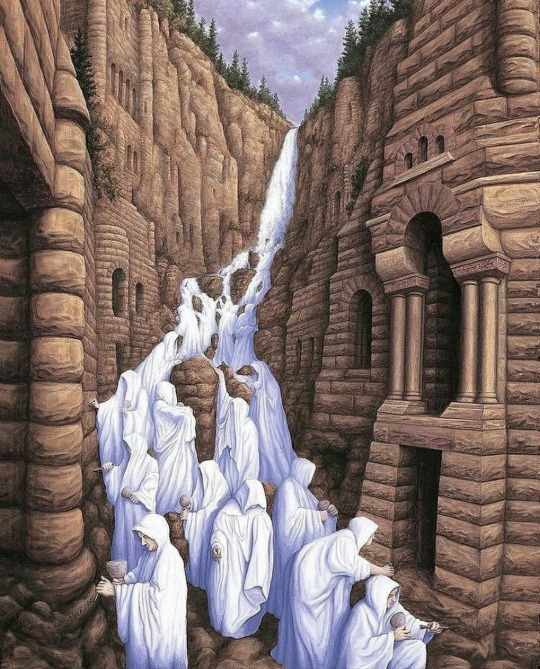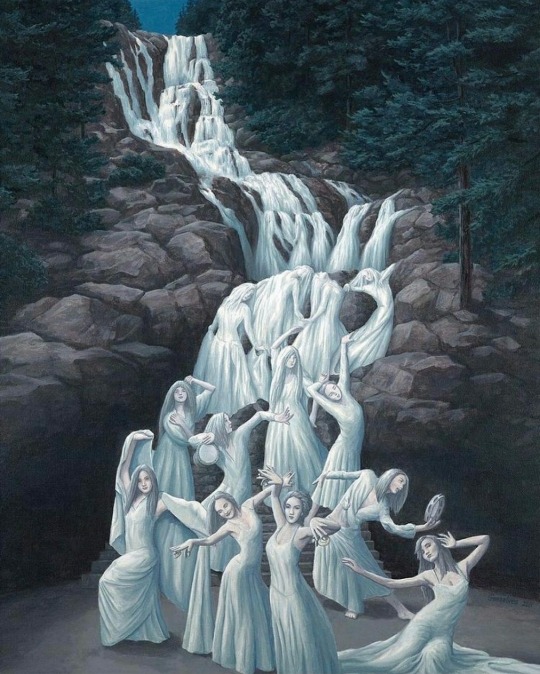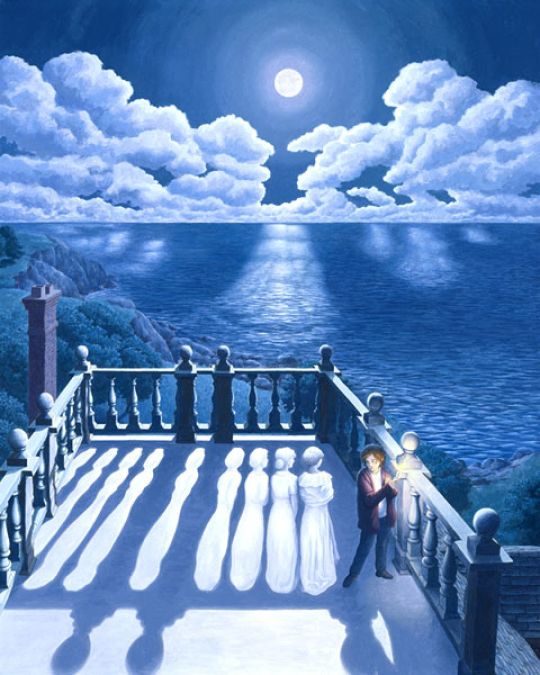Text
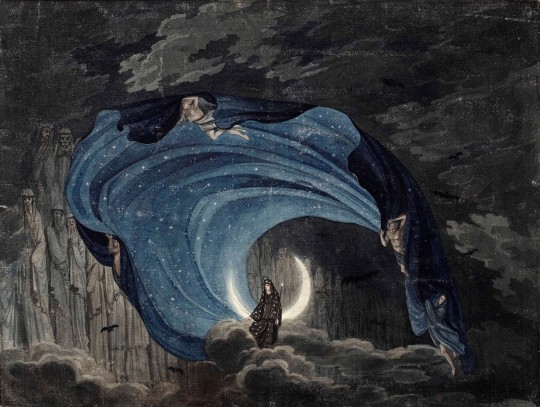
The Queen of the Night (Simon Quaglio, 1818)
7K notes
·
View notes
Text
the idea that the moon was once a part of the earth, and now reflects the divine light of the sun to guide us through the darkness... 'drawing down the moon' as the practitioner ascending from the mundane via self-identification, invoking hekate or thoth or artemis or whichever lunar superintelligence to become something that also reflects and channels celestial energies... turning our eyes skyward to the constellations and seeing ourselves, our history, our imagination, all of it, gazing back at us
205 notes
·
View notes
Photo
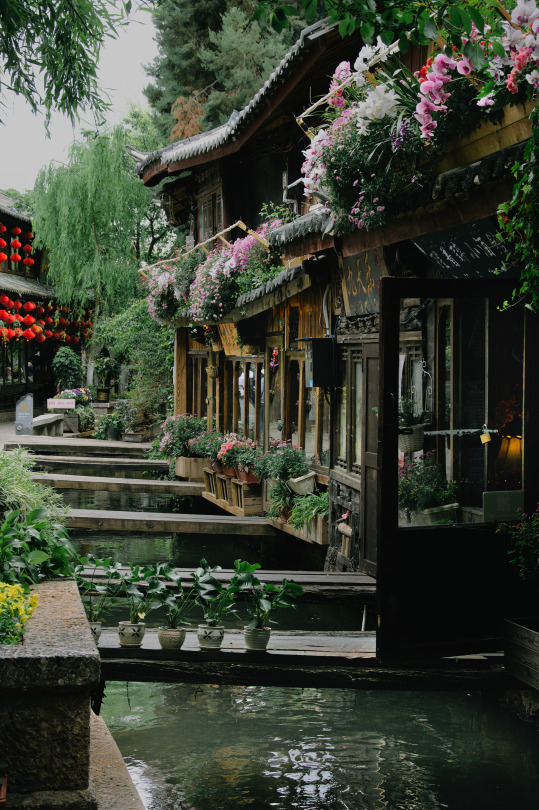
Lijiang, 2019
#china#yunnan#lijiang#kinda curious about the fengshui of a house built directly across a river#would love to live there though
842 notes
·
View notes
Text
Music that fixes you by 李老师与筝
#china#music#guzheng#would like to learn the guzheng someday#but I told myself I would master the lyre first
1K notes
·
View notes
Note
Do you personally believe in Asian superstitions surrounding lucky and unlucky numbers? As somebody trying to make something but unsure of how much these beliefs have an influence on me it highkey drives me insane 😭
Hi there!
I did have this same struggle once with superstitions in general. Like you, I had the thought of "Should start believing in all these things now that I'm a spiritual person?"
Superstitions are held by laypeople who have an indirect and watered-down understanding of the world of spirit. There is undoubtedly some truth in them, yes, but it is often over-simplified, incomplete or misinterpreted. Think of Plato's allegory of the cave, where the prisoners see only the shadows on the wall and not the objects that cast those shadows.
What we do as spiritual practitioners is to ponder and investigate why and how, and base our craft and cultivation on that.
Just as a layperson can tell you that aspirin reduces the sensation of pain, but a scientist can explain the chemistry of why and how it happens.
You've probably heard of iron being used as a protective metal to repel Faery Folk, right? It's a natural assumption to make that iron is somehow fundamentally harmful to fae. This fascinating post by Lailoken proposes instead that iron is in fact sacred to the Folk, and the perversion of this metal through smithing is what repels them.
Remember, that spiritual practitioners, occultists, witches, magicians, sorcerer/esses (etc) are beings that laypeople have superstitions about.
I suspect you have visited my blog because you consider yourself to fall into this general category 🙂 So ask yourself, on what basis do you believe in the superstitions of your ancestors?
Onto the topic of numerology...
If I may: what you are really asking me is, where do things get their power from?
Laypeople believe that 4 (四) is unlucky simply because it is a homophone for death (死), or that 6 (六) and 8 (八) are lucky because they are homophones for the flow of fortune (溜, and 发 as in 发财).
Is there power in this? Perhaps, from the collective psyche of innumerable people making this connection. Whether it is powerful depends on how well you can tap into that current of psychological power. I personally find the idea of homophones creating in/auspicious numbers to be shaky, so I struggle to invest much belief in it.
I do believe that there is power and meaning in numerology, though. In magic, numbers are symbols, in the same way that colours, shapes, plants, animals, and celestial bodies are.
These things have power from how they naturally express themselves in reality. Allow me to expand on this:
1 is the number of beginnings, individuality, single-pointed focus. It can be used to express both the entirety of existence or the tiniest piece of it.
2 is duality, polarity, cycles and opposite or/yet complementary forces. Day and night, yin and yang, heat and cold, mother and father. It is attraction, passion and pursuit, such as that between predator and prey, or between lovers. Hence it begins to generate movement and force.
Where 1 lacks motion because it has nothing to be moved by, 2 creates a dynamism as it strives to find balance and union.
3 is the number of innovation and creativity, born of the attraction and movement of 2. Between fire-hot and ice-cold, between Heaven and Earth, 3 is the sweet spot in between that creates life, drawing on powers from contrasting forces.
3 is the first number where stability and balance can be found (a chair cannot stand on 2 legs, but it can on 3; pyramid structures are highly stable). 3 is the number that brings a sense of space and time: length/width/height, past/present/future. Triangles are used in magic for conjuration as well as for trapping spirits.
4 creates foundations upon which all else is built. The four elements, cardinal directions, seasons, DNA nucleotides. Therefore it is a number of solidity, consistency and endurance, yet it can also mean stagnancy and obstinance. You could argue that 4 is unlucky because it can be used as a symbol of imprisonment; after all, death is a fate none of us can escape.
5 is often the number of transformation, as our five-fingered hands create and destroy. 5 brings conflict because it is attempting to break out of the solid confines of 4 (incidentally, 5 is also associated with Mars, the planet of aggression).
In East Asia, we have 5 elements instead of 4. Hence our elements work differently; they are not building blocks or foundations, instead they represent the ever-changing and dynamic forces of reality that are constantly overpowering or being subdued by each other.
Conclusion
I'm vaguely aware that numerology features heavily in Daoist magic, but I have no idea how much of what I said above overlaps with Daoist numerology and how it is used in ritual. Even so, like any esoteric tradition, it is a study of the nature of reality, and anyone can attempt to reach these revelations through their own studies and meditations.
I hope I have demonstrated that it is not so simple as 'lucky' and 'unlucky', 'good' or 'bad'. Just as it is with all things. The water that nourishes and brings life, can also destroy everything in a mighty flood.
I also hope I have been able to inspire some clarity in you on this matter 😊 good luck on the path.
7 notes
·
View notes
Note
So i've been wondering is there any god and goddess or any entity who share similar trait to the buddha beside hecate
Yes, I believe so.
My exposure to Christianity and Catholicism is very limited, but from my perspective, the Virgin Mary has many qualities of an enlightened being. Not least because of her compassion and widespread worship; Mary is sometimes conflated with Guanyin by Chinese Christians. She has a whole host of epithets that tell of her power: the Mother of God, Queen of Heaven and Empress of Hell.
I also think Brighid (the goddess, the saint) may be enlightened as well, or very close to it. Her multi-faceted nature, her appearance across Celtic paganism, fairy faith, Catholic/Christian and African traditions speak of her authority, flexibility and compassion for all.
Of course, this is just my opinion, and I do not have the ability to verify this. But the take home message is that Buddha-nature is not restricted to Buddhists. Enlightened beings can be found anywhere, and they are as numerous as the stars.
3 notes
·
View notes
Note
What are some guidelines you follow when you choose to work with a deity? With me, I don't involve myself with those from closed practices or I'd risk retaliation by the people or by the entity themselves. There are beings that sound like they could give me bang for my buck but I'd have to consider if I needed their assistance for a ONE time thing rather than sought out a deeper relationship. Weee there cases where you needed help for a one time scenario and ended it there?
Hi there, apologies it's been so long. I was moving house just as you sent in this question! Now that I'm more settled, let's see if I can tell you something helpful :)
Personally, I've always gone for the deeper relationship. I've not been in a situation where I needed to ask a particular spirit/deity who I didn't know for particular things. But that's just my preference. I value the trust, and invested time and energy I've built up with a being, over what their 'official' expertise is. A spirit or god always has unadvertised skills or other allies they can call on, after all.
That's not to say I've always been successful with it. I've chosen gods I was interested in, made good faith gestures through offerings and prayers, and plenty of times I didn't get the response I was looking for. In which case I would just move on, keep looking, and deal with problems by myself. I've had hard times like anyone else, but I've not been in dire enough situations to feel the need to ask help from a deity I've never worked with before.
Even if you have not settled on a pantheon or tradition, there are still your ancestors and spirit neighbours who live in the same locale as you. Those beings will impact your day to day life more directly, so it's always being friendly to them, giving an offering now and then. At the very least, so they don't hinder you, but in the best case they may like you enough to actively help your endeavours.
If you are looking for a patron deity, one you want to be serious about, there are some things I could recommend. But bear in mind this is based on my own principles; I choose my gods like I choose a significant other. I tend to walk the Path of the Devotee. This is the norm in East Asian magic, so it may be a cultural thing for me as well. It is certainly an exercise in patience.
You might prefer to do things differently, so feel free to ignore if that's not your style.
If the deity is part of an established tradition or unbroken lineage, this is much easier. If the tradition is large enough, they will usually provide laypeople practices you can get started with. You don't have to initiate for this. Otherwise, you'll need to speak to a verified shaman or priest of that tradition and ask them for advice.
Basically, if a tradition has survived hundreds or thousands of years, you can have faith that there is at least something to it – i.e. the deity has already been vetted by that lineage as being capable of supporting several generations. Therefore instead you would evaluate the (human) teachers of that tradition to see if you are happy to receive their guidance. Of course, the teachers have the right to evaluate you too.
If the deity of interest is not currently a patron of an unbroken lineage: you'll have your work cut out for you.
First, study the deity's reputation. I've always looked for virtue in the deities I venerate. Namely, I look for evidence of their compassion, a sense of responsibility for other beings. I choose them as I choose my friends and teachers. The beings you surround yourself with, are the ones you will become more like. Needless to say, don't choose a patron based on just their aesthetic appeal.
I do research on their lore and look for other devotee's experiences of them. You want to pay attention to devotees who have been actively venerating that deity for 10 years or more. How have they grown throughout the time of that relationship? Have they come out of major life obstacles wiser, stronger, more at peace? Can they honestly say that they feel supported and empowered by their deity?
Sometimes a person's life is just a result of their own poor choices and not the deity's lack of responsibility for their followers. But you get plenty of people who claim they are a 'priest/ess' of their deity, that they have been blessed or chosen, or have ecstatic experiences – and yet they can barely manage a shred of humility or a kind word, or they constantly complain about their life being terrible, or they've been stuck in the same negative cycles for years on end. "The proof is in the pudding", as they say.
In any case, there is no point in devoting yourself to a god that will not elevate you and help you become a better version of yourself. Godhood, power and influence, is by itself not a worthy enough reason for veneration. There are many, many gods. Little gods, bigger gods. Not all of them are truly transcendent. And many you will simply not have an affinity for. Don't place your life into the hands of one who will drop you.
Making contact
After you've verified the deity's reputation, look for the best ways to contact them formally. Traditional prayers, invocations, mantras, offerings and so on. Make a good impression, express your interest, tell them about yourself, tell them what you admire about them, and so on.
At this point, you could go all out, do a big ritual and ask for their help on something, see what the outcome is. As I said, I don't normally do this, because I think it requires a strong magical and spiritual skill set (which I don't have). But that would be a good way to evaluate the deity as well.
Either way, continue to make regular attempts to contact the deity, always with an offering, however small it might be. Meditate on them and their symbols. This is building your own reputation with the deity and carving a channel of communication with them.
When it comes to assessing the value of a relationship with a deity, I always try to give it at least 6 months to a year. It sounds like a long time, but I personally do not have very strong psychic senses so I need plenty of hindsight to see if my efforts are having the desired effect. And besides, if one is looking for a life-long patron, 1 year is really not that long.
In that time, I make a lot of notes on if/how my requests were answered, if/how my life has improved in that time, any visions or knowledge I've received on the deity, how successful my divinations were, and in general if there is a growing sense of closeness between myself and the deity. It is well worth doing a few big rituals here and there because this is the best way to assess the accumulation of one's efforts.
So, this is how I would get started. I hope it helps, let me know if you have anymore questions on the matter 🙂
18 notes
·
View notes
Text
if i can impart any one piece of wisdom to y’all, it’s to, whenever possible, assume good intentions
assume people are trying their best, want to be good and treat others well, and that when their behavior doesn’t align with those goals, it’s because of outside factors that are pushing them to their limit
it’s hard to do, it doesn’t always come naturally, but it’s worth it
71K notes
·
View notes
Text

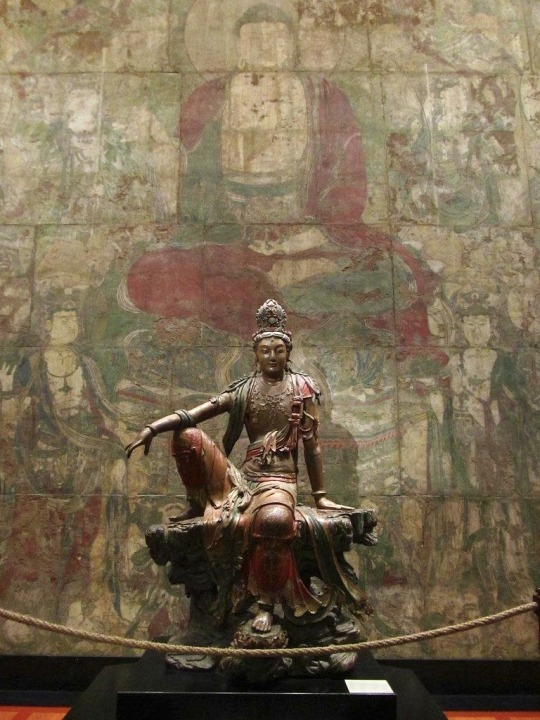
Guanyin of the Southern Sea
A wood statue of the Chinese-Buddhist deity Guanyin. Made during the Liao (916–1125) or Jin (1115–1234) dynasties.
It’s currently located in The Nelson-Atkins Museum of Art, Kansas City, Missouri.
466 notes
·
View notes
Note
greetings! i'm new to buddhism and i would be curious to know if you have any tips for westerners regarding the practice. i see a lot of people online aggravated by western attitudes at times and as new convert, i would like to avoid contributing to that. thank you!
Hi there :)
I suppose one of the greater issues is that there is a mindset of... shall we say, pioneering and innovation that can be unhelpful when approaching Asian traditions.
Western practitioners like to experiment, change the rules, "fuck around and find out" as they so often say. This works out well enough for them – in fact I think Western practitioners often thrive on their enthusiasm to explore, when it is balanced by discernment – but it is not an attitude that will get them far if they decide to train properly in an Asian tradition.
What we have in Asia that is lacking in Western traditions, are culture, history and esoteric lineages spanning thousands of years, and techniques that have been refined through trial and error with each passing generation. European traditions don't have this kind of unbroken lineage, which creates some distinct differences in mindset.
A Western practitioner might consider themself 'advanced' after 5-10 years of practice. But to become a Buddhist monk, guru/lama or Daoist method master, in that time you might only have just completed basic training (depending on tradition; I'm making broad generalisations here).
There is such a thing as spiritual authority, and Westerners sometimes don't like to hear this. After all, for many, becoming a witch/sorcerer/magician/spiritualist is all about taking fate into your own hands, claiming the universe's power, the church be damned, etc. Asian witchcraft and malefica does exist, however it is not treated as the path of self-liberation and sovereignty as it is in the West, so please do not mistake it as such.
(Diasporic Asians like to claim titles such as 'witch', and this is fine, but just bear in mind this has a decidedly negative connotation when you visit countries in East Asia).
The line between laypeople and ordained monks and priests is very clearly defined, and one is expected to show deference. This does not mean any sort of self-deprecation, rather, to understand one's own limits and keep an open and curious mind. Just as a layperson would not presume to know better than a trained doctor or surgeon.
Therefore, having ample patience will serve you well. You should expect to repeat the same basic practices 100s and 1000s of times, because cultivation is grueling and the path to Buddhahood, Immortality, or what have you, is something that takes lifetimes to achieve.
Now, that may not be your goal. You might simply want to live well in this life, and that is fine. The above message is more for those who aspire for mastery, importance or greatness, but do not yet understand what the journey requires. (I don't claim to understand it myself either).
This might be obvious, but in case it is not... be discerning about who you trust to guide you. There are genuine European/white practitioners who have entered their respective traditions the correct way, and there are Asian frauds and charlatans who have no qualms about using their cultural traditions to con people out of their money. You should respect what people have to say about their cultures and experiences, naturally, but don't use someone's ethnic background as a validation of their skill or character.
Most of all, maintain humility. Humility is the virtue that supports all other virtues. One that I think all of humanity struggles with the most, perhaps because we don’t understand it very well, and our survival has so often required its opposite.
Beyond that, I advise you not to place too much emphasis on seeking knowledge in books or written texts. The main reason for this: published texts on Buddhist practices come from oral traditions that may require empowerment and transmission. The people who publish these texts might not understand this, or they are relying on the good faith of spiritual seekers. One does themself a great disservice if they believe they can bypass the guidance of a teacher from a long-standing lineage.
The other reason is that the wisdom, capacity and personal growth one gains through cultivation is experiential. It can only be gained through consistent practice. A skillful teacher can guide you on the path, but ultimately, the real thing cannot be taught, and all words fail to capture its true majesty.
I hope this helps, and doesn't come across as too intimidating. Take it slow, let the path unfold before you, and enjoy each day as it comes. Keep a green bough in your heart, and the singing bird will come 💚
10 notes
·
View notes
Note
What drew you to Hekate? At a first glance I was taken aback until I recalled that you work with Ksitigarbha who is also associated with the Underworld since his pledge involves freeing suffering souls from it.
A good question...
Hekate is more than a goddess of witchcraft and the ghostly dead. She is a goddess of ever going beyond. Beyond oneself, one's limits, beyond the known and the unknown. In the Chaldean oracles, she is the world soul – a fully transcendent being who rules over the sky, sea and underworld. To the ancients who did not have the means to explore the planet and outer space, these three realms would have seemed to stretch on endlessly.
She takes many forms – the wrathful Brimo, the mysterious three-faced Enodia, the majestic and empyrean Soteria. She was spoken of highly by my Buddhist peers as having the qualities of a Buddha, one who has gone beyond duality.
I think the most concise answer is that I wanted to learn from her, and be like her.
Even more so after I learned of Jason Miller's background in both Western occultism and esoteric Buddhism, and the course he teaches on Hekate. It seemed to occupy the same space between East and West that I so often find myself in, as someone who is mixed race, bilingual, and has spent time living on both sides of the world.
I found Hekate intimidating for a long time, but I would have truly regretted it if I never made the attempt to reach out. And I am very glad that I did.
Ksitigarbha is indeed associated with the Underworld, but one should not mistake him as an Underworld being. He is an enlightened bodhisattva, and he is not restricted to the Underworld by any means. One can call upon his aid from anywhere.
He noticed that Hell beings are so often overlooked due to their terrifying nature, and his empathy inspired him to take a vow to never rest until the Hells are emptied of suffering souls. Even the demons who cause suffering are, themselves, suffering. He also takes care of the souls of children who find themselves lost in the Underworld.
In a similar way, Hekate is known to be a psychopomp who looks after the restless, unburied and unloved dead. They follow her because of her compassion, and she gives them shelter and purpose.
Some of us may be lucky enough to find ourselves in a pleasant afterlife, but even so, there are many spirits in our ancestral line who did not, and their karma influences our own. It is not to strange to venerate Underworld deities when one understands that we are not so separate as we think. Death feeds on life, and life feeds on death.
12 notes
·
View notes
Text
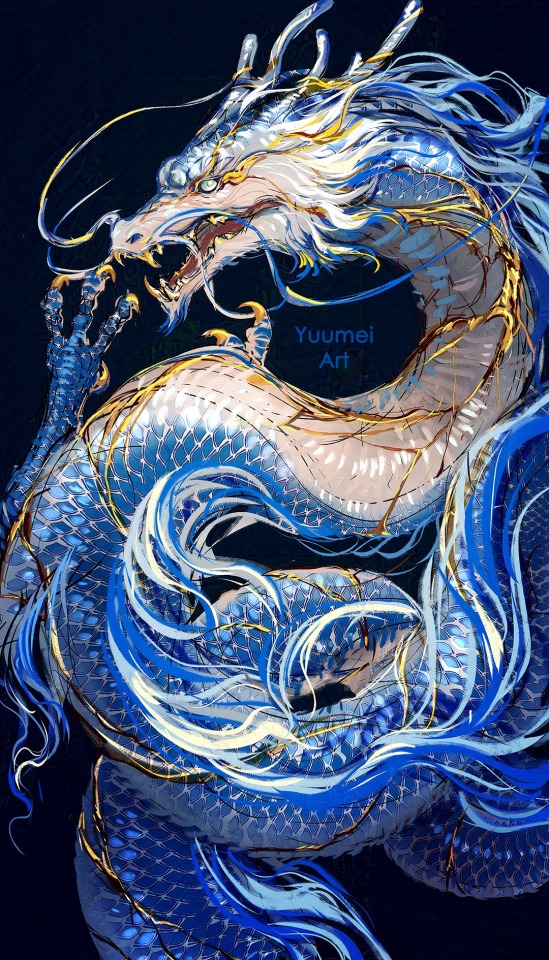
Happy Year of the Dragon!
I love the idea of kintsugi so here's a porcelain dragon that highlights the broken seams with gold. Despite all the pains of hardships in life, we are beautiful.
50K notes
·
View notes
Photo
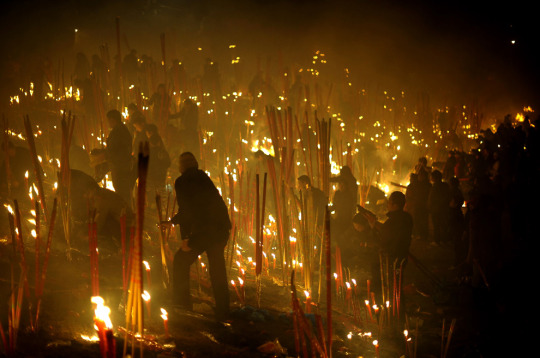
Chinese Taoist worshippers light joss-sticks as they pray beside the Dafo temple in Chongqing on the first day of the Chinese Lunar New Year on February 14, 2010.
Source: Boston Globe
291 notes
·
View notes
Note
You once mentioned that in Buddhism the thought is that the root of beings is good but that they were poisoned overtime. It gave me some food for thought in the form of people who go through a lot and carry the pain from those experiences and internalized it. I thought it's like flowers that got covered in dirt or happened to have clouds overshadow them, it doesn't change the fact that they're still beautiful plants it's hard to remember that they are when various circumstances obscure it. So it feels unpleasant and you can feel lost but the core is the same: a flower is a flower. I'm saying this to myself whenever I become self-critical due to stuff I internalized as well because it makes me realize my centre doesn't = to whatever happened to me. I hope that made sense and just thanks for that comment before!
That is one of many ways to think about it. But we are not flowers, not good nor bad, not this nor that. We simply are, and it is the endless narratives that we create of ourselves and others that obscure our true nature.
I think of us more like a clear glass or mirror orb that reflects, and therefore contains, the entire universe. A mirror, simultaneously is and isn't what it reflects. Both dual and non-dual. A mirror that got covered in layers and layers of stories and narratives and mental constructions, that obscure our view of reality.
Or perhaps those layers are on the inside of the mirror orb, and we are so vast as to contain all of creation within us. Through meditation we realise how small those narratives are, and/or how vast and all-encompassing we are. How what we thought was our entire selves, are actually so small and one of many selves that we could be. And when that realisation dawns, our limits seem to dissolve.
It's a little hard to describe these things without slipping into poetic tangents that would sound mad to anyone who hasn't experienced the feeling for themselves.
Still, I'm glad that it was thought-provoking for you :)
8 notes
·
View notes
Text
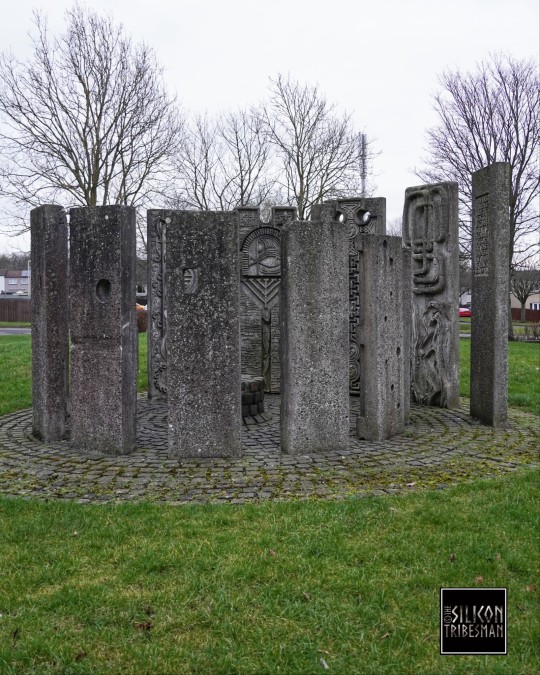
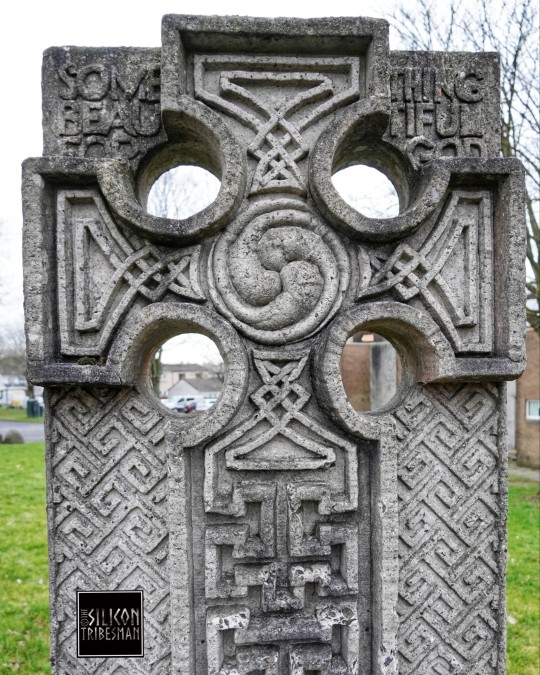
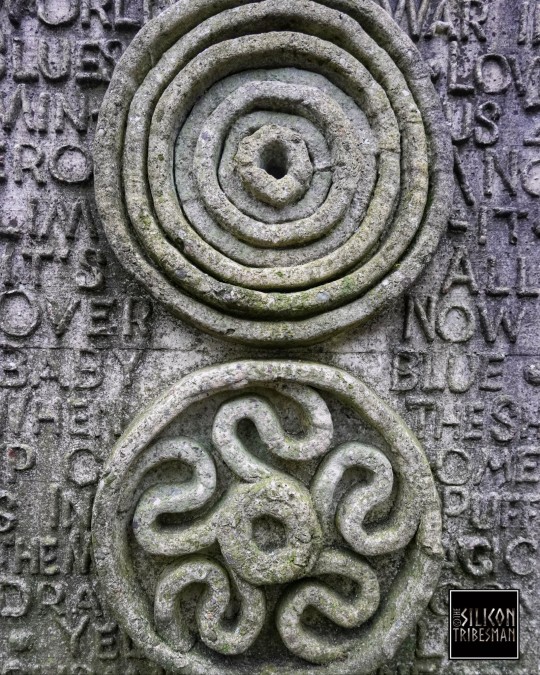

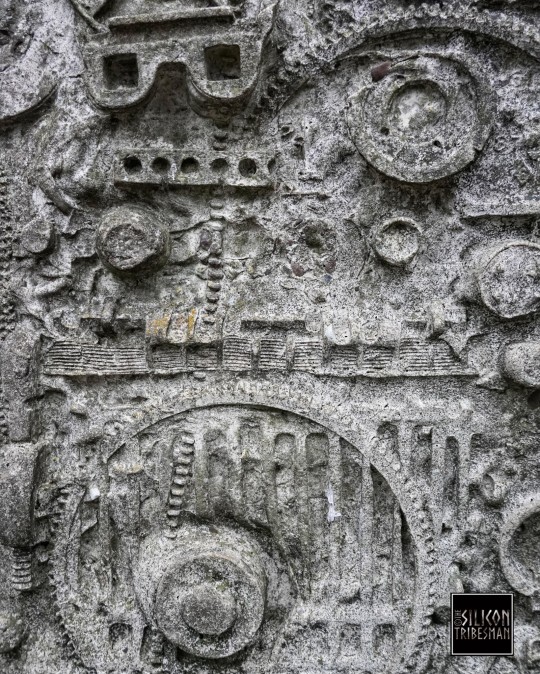
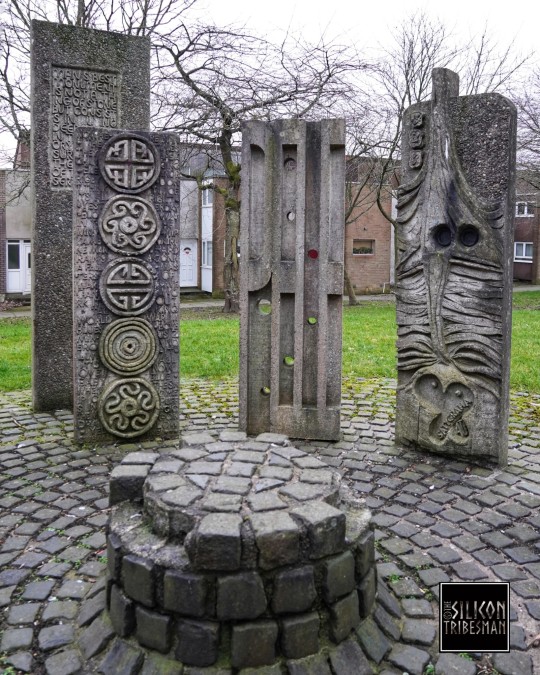
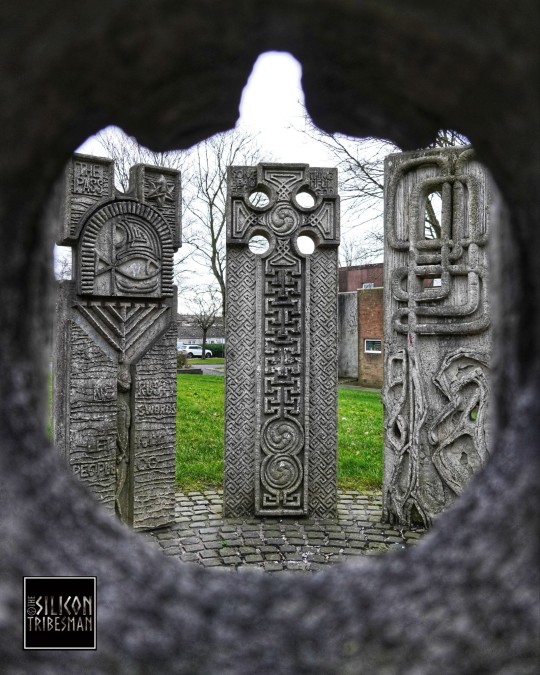
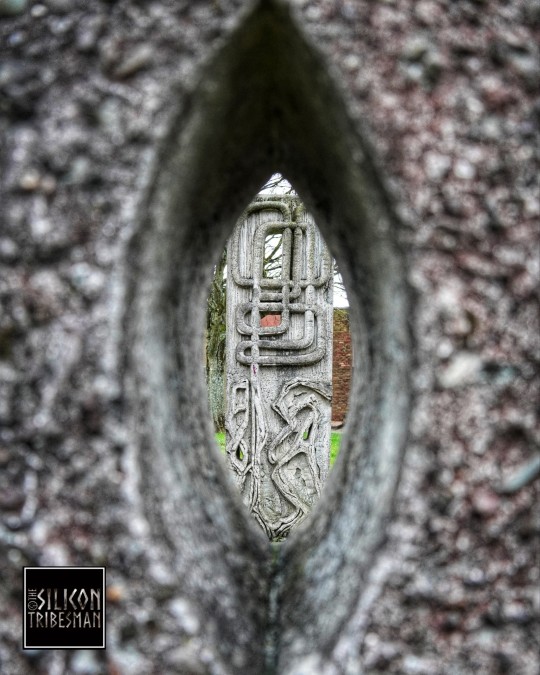

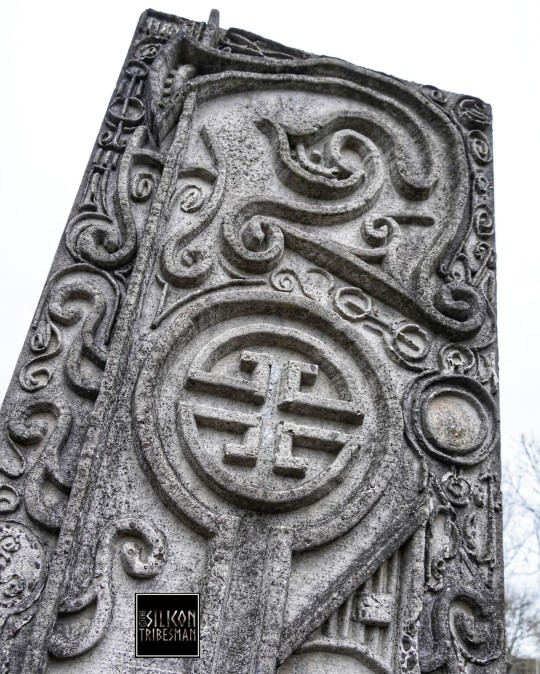
David Harding's 'Henge', Glenrothes, Scotland
A first visit to this piece of outdoor art in a town rich in ancient sites.
500 notes
·
View notes
Note
I'm on the move quite abit so the space I'm allotted isn't big enough to have multiple altars for each deity i venerate. Suggestions? Do certain deities get irritated at having to share an altar/does it get in the way of communication?
Hi there 🌿
Firstly, I think it's worth figuring out what's truly important for you to commune with your deities. An altar for each is nice to have, but do you really need that?
In my practice, all I truly need is a mala / rosary / string of beads. I visualise the deity in my mind, and recite a mantra or invocation that is connected with them. That's all.
I may also pack a lighter, some incense, a meditation oil, and some other portable tools. But basically, everything essential to my practice fits into a pencil case.
You could get a small picture frame and print off an image of each deity, then swap out the images depending on who you wish to pray to and make offerings to. I've also heard of people using a dedicated box or cloth to lay out temporary altars that are put away after communion.
Altars and devotional tools are great ways to boost connection with the deity, but remember the true source of that connection lies within you.
I am sure that certain deities and spirits will not like each other. You would have to consult the lore, and other devotees, to know which ones would rather avoid each other. Generally if a deity is highly popular and known to be vast, accepting, and gracious, they will not mind who you put them with.
In any case, I think it is better to give them their own defined space, or only with other deities and spirits they are known to associate with in a positive way. Different pantheons should certainly be kept separate, out of respect. I do not know if it will affect communication, that depends on your own capacity.
I personally find it distracting to have too many deities on an altar, but if you have a good relationship with them all and they work well together... why not?
6 notes
·
View notes
